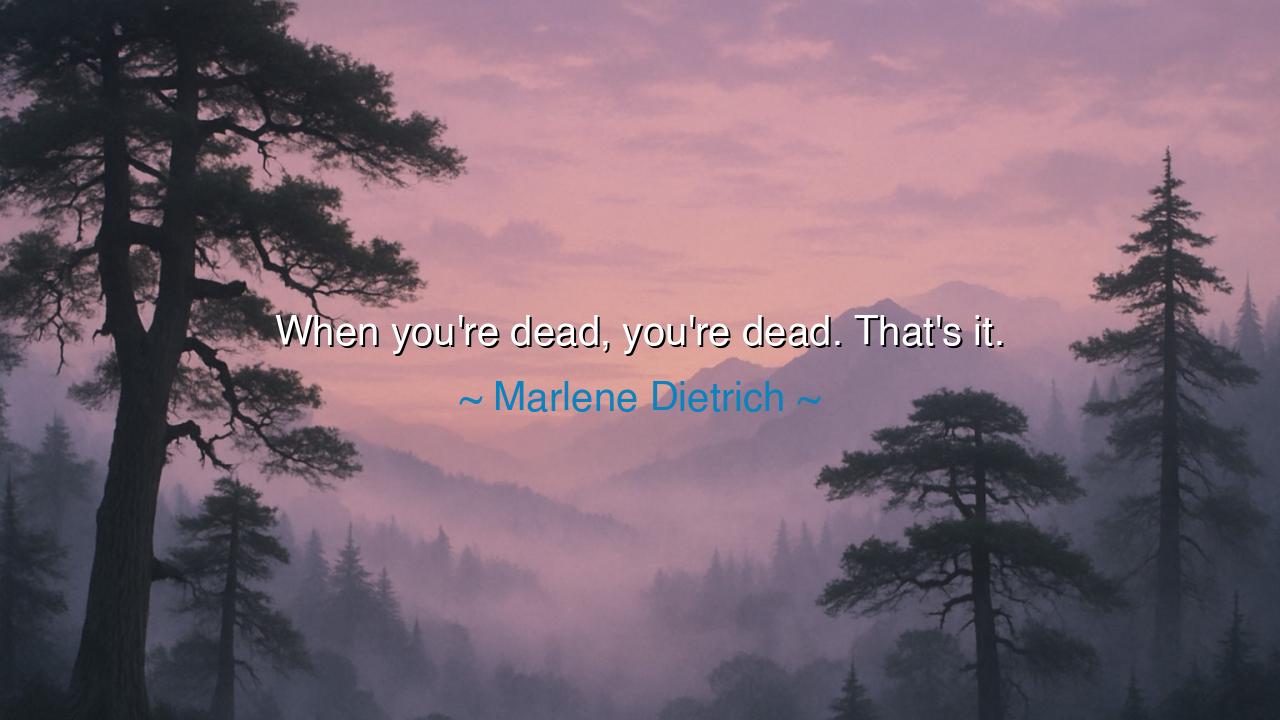
When you're dead, you're dead. That's it.






“When you’re dead, you’re dead. That’s it.” — Marlene Dietrich
In these stark and haunting words, Marlene Dietrich, the great actress and chanteuse, speaks with the clarity of one who has gazed unflinchingly at the nature of existence. Beneath her bluntness lies a deep philosophy — one that cuts through illusion and superstition alike. “When you’re dead, you’re dead. That’s it.” To some, this may sound cold, but to the wise, it is a call to awakening. It is a reminder that the sands of time flow only one way, and that our brief spark of consciousness is the most sacred gift we will ever hold. In her fierce simplicity, Dietrich does not deny mystery — she demands that we honor life while it burns, not in dreams of what may follow after.
The ancients, too, wrestled with this truth. The Stoics of Greece and Rome — Marcus Aurelius, Epictetus, and Seneca — spoke often of mortality as the great teacher. “You may leave this life at any moment,” wrote Aurelius, “let that determine what you do and say and think.” Like Dietrich, they believed that death’s certainty is not to be feared, but revered — for it gives life its shape, its urgency, its worth. Those who remember that death is final do not waste their hours in vanity or cruelty; they live with intensity and purpose. For when the candle burns for but a while, every flicker matters.
Dietrich’s words are not born of despair but of clarity. She was a woman who lived fiercely — an artist, a lover, a soldier of spirit. In her youth she enchanted the world with her voice and her beauty; in her later years, she stood against tyranny during the fires of war, performing for soldiers and speaking out against oppression. She lived with courage, defiance, and grace. And when she spoke of death, she spoke as one who had tasted life in all its shades — who knew that its power lay not in its length, but in its depth. To her, the finality of death was not a curse, but a reason to live truthfully, joyfully, without delay.
There is a tale of Achilles, the warrior of myth, who was told he could live a long and quiet life, or a short and glorious one that would echo through eternity. Achilles chose glory, knowing that his days would be few. In this, he understood what Dietrich later voiced in mortal terms — that immortality is not a matter of surviving death, but of living so fully that one’s spirit transcends it. For though the body perishes, the memory of a life lived in passion and authenticity endures beyond stone and time.
When Dietrich said, “That’s it,” she was stripping away the false comforts that men often weave around themselves — tales of endless afterlives and second chances. Her words are not an argument against faith, but a reminder that faith alone cannot replace the duty of living now. Too often, people wait for “tomorrow,” for “someday,” for the right hour to begin living. But death waits for no man, and “someday” never comes. The wisdom here is not nihilism — it is liberation. If this life is all we have, then let us live it without fear, without hesitation, without waste.
For in the end, every human being faces the same horizon. Whether one believes in heaven or silence, all must confront the fact that life is fragile, and that time, once lost, cannot be reclaimed. Dietrich’s declaration is a hammer against complacency, a challenge to the living: Make your days worthy of your breath. Do not live as if eternity will grant you rest — live as though your heart’s next beat may be your last, and fill it with love, with truth, with action.
Lesson:
Let the wisdom of Marlene Dietrich be a torch to light your path — life is brief, and that is its glory. Waste no hour on hatred, envy, or fear. Tell those you love that you love them. Create beauty where you can, heal what you touch, and savor the small wonders that surround you. Do not wait for the afterlife to give your existence meaning — give it meaning now. For when death comes — as it surely will — may it find you not waiting, not regretting, but alive to the very end, having lived as if this one life were the eternal gift it has always been.






AAdministratorAdministrator
Welcome, honored guests. Please leave a comment, we will respond soon